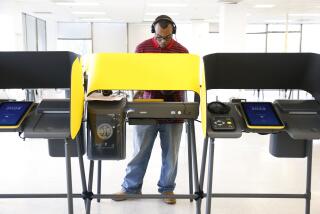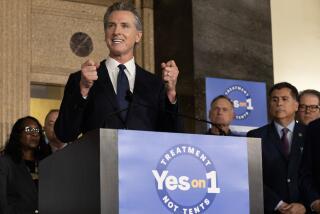Initiating a fix for California
This week, the state Senate and Assembly may take up a legislative rarity: a bill that could actually strengthen democracy in California. The measure, championed by Senate Democratic leader Darrell Steinberg, would mandate that initiatives be voted on only in general elections, not in primaries.
Steinberg’s brainchild has been condemned as just the latest partisan ploy from a Sacramento pol. Republicans complain that it seeks to move a ballot measure they support — barring unions from spending some of their members’ dues on election campaigns — from next year’s June primary to the November general election. Democrats counter that next year’s primary is likely to have a disproportionately Republican electorate, as the GOP’s presidential nomination contest may still be ongoing while Democrat Barack Obama will be running unopposed.
But if we can disengage from the partisan particularities of 2012, the case for holding our initiative voting in general elections only is overwhelming — and one that both parties should support. To begin with, general elections draw electorates that are far larger than those that vote in primaries. According to the United States Elections Project, which measures eligible-voter participation in presidential election years, just 40% of the state’s eligible voters turned out for the 2008 primary, while 62% voted in the November general. In 2004, 31% turned out for the primary and 60% for the general. In 2000, the figures were 40% for the primary and 57% for the general.
The same pattern persists in nonpresidential years. Last year’s primary election had a registered-voter participation rate of 33.3%, while 59.6% voted in the November general.
The increased turnout in general elections is across the board; Democrats, Republicans and most especially declined-to-state voters all come to the polls in greater numbers in November than they do for the primaries. Moreover, primary turnout is invariably skewed toward whichever party has the hotter contest for nomination to a high office.
Consider: Whenever a president seeks reelection, he is almost invariably unopposed for renomination. At the same time, the party out of power usually has a high-profile and impassioned contest for its presidential nominee. The turnout in that primary election is skewed, therefore, to the party out of power: the Republicans in 1996, the Democrats in 2004 and, most probably, the Republicans again in 2012. The same pattern appears for gubernatorial primaries in years when the governor is seeking reelection. It can also be the case when one party’s nomination is unopposed while the other’s is contested, as was true last year when Democrat Jerry Brown had no prominent primary opponents, while Meg Whitman and Steve Poizner duked it out for the Republican nod. In that primary election, Republicans’ turnout was 10% higher than the Democrats’.
Imagine what would happen if the rules allowed the Legislature to play the same games we now play with initiatives. Suppose the Legislature didn’t need a quorum to enact legislation. Votes could be taken before the members of one party had arrived on the floor. This is exactly the kind of outcome we ensure by allowing initiatives to come before voters in primary elections. An initiative enacted in the 2004 presidential primary, when just 31% of the state’s eligible voters participated, could have become law by the vote of just 16% of California’s voter-eligible population. That would be equivalent to the 80-member Assembly being able to pass a bill with just 13 votes. California enacts as many important laws at the ballot box as it does in the statehouse, and for that reason we need to ensure that they are voted on by the largest possible portion of the state’s voters.
The case for voting on initiatives in general elections only is that the November electorate is larger, more representative of the state as a whole and less skewed to a particular party than the primary electorate. Far from being just one more instance of political gamesmanship, Steinberg’s proposal would actually create a significant impediment to political gamesmanship. As things stand, both parties and various interest groups time their favored ballot measures to come before the voters in primaries with turnouts skewed to their particular concerns. Mandating that all such measures appear on general election ballots, by contrast, would bring this particular form of vote manipulation to a shuddering halt.
For anyone who believes in majority rule, it’s a consummation devoutly to be wished.
Harold Meyerson is editor at large of the American Prospect and an op-ed columnist for the Washington Post.
More to Read
A cure for the common opinion
Get thought-provoking perspectives with our weekly newsletter.
You may occasionally receive promotional content from the Los Angeles Times.






